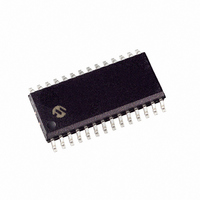PIC16F767-I/SO Microchip Technology, PIC16F767-I/SO Datasheet - Page 157

PIC16F767-I/SO
Manufacturer Part Number
PIC16F767-I/SO
Description
IC PIC MCU FLASH 8KX14 28SOIC
Manufacturer
Microchip Technology
Series
PIC® 16Fr
Datasheets
1.PIC16F616T-ISL.pdf
(8 pages)
2.PIC16F688T-ISL.pdf
(688 pages)
3.PIC16F737-ISP.pdf
(276 pages)
4.PIC16F737-ISP.pdf
(10 pages)
Specifications of PIC16F767-I/SO
Program Memory Type
FLASH
Program Memory Size
14KB (8K x 14)
Package / Case
28-SOIC (7.5mm Width)
Core Processor
PIC
Core Size
8-Bit
Speed
20MHz
Connectivity
I²C, SPI, UART/USART
Peripherals
Brown-out Detect/Reset, POR, PWM, WDT
Number Of I /o
25
Ram Size
368 x 8
Voltage - Supply (vcc/vdd)
4 V ~ 5.5 V
Data Converters
A/D 11x10b
Oscillator Type
Internal
Operating Temperature
-40°C ~ 85°C
Processor Series
PIC16F
Core
PIC
Data Bus Width
8 bit
Data Ram Size
368 B
Interface Type
AUSART, CCP, I2C, MSSP, SPI
Maximum Clock Frequency
20 MHz
Number Of Programmable I/os
25
Number Of Timers
3
Operating Supply Voltage
4 V to 5.5 V
Maximum Operating Temperature
+ 85 C
Mounting Style
SMD/SMT
3rd Party Development Tools
52715-96, 52716-328, 52717-734
Development Tools By Supplier
PG164130, DV164035, DV244005, DV164005, PG164120, ICE2000
Minimum Operating Temperature
- 40 C
On-chip Adc
10 bit
Lead Free Status / RoHS Status
Lead free / RoHS Compliant
For Use With
XLT28SO-1 - SOCKET TRANSITION 28SOIC 300MILI3DBF777 - BOARD DAUGHTER ICEPIC3
Eeprom Size
-
Lead Free Status / Rohs Status
Lead free / RoHS Compliant
Available stocks
Company
Part Number
Manufacturer
Quantity
Price
Part Number:
PIC16F767-I/SO
Manufacturer:
MICROCHI
Quantity:
20 000
- PIC16F616T-ISL PDF datasheet
- PIC16F688T-ISL PDF datasheet #2
- PIC16F737-ISP PDF datasheet #3
- PIC16F737-ISP PDF datasheet #4
- Current page: 157 of 276
- Download datasheet (6Mb)
The value in the ADRESH/ADRESL registers is not
modified for a Power-on Reset. The ADRESH/
ADRESL registers will contain unknown data after a
Power-on Reset.
After the A/D module has been configured as desired,
the selected channel must be acquired before the
conversion is started. The analog input channels must
have their corresponding TRIS bits selected as an
input. To determine acquisition time, see Section 12.1
“A/D Acquisition Requirements”. After this acquisi-
tion time has elapsed, the A/D conversion can be
started. An acquisition time can be programmed to
occur between setting the GO/DONE bit and the actual
start of the conversion.
The following steps should be followed to do an A/D
conversion:
1.
FIGURE 12-1:
2004 Microchip Technology Inc.
Configure the A/D module:
• Configure analog pins, voltage reference and
• Select A/D input channel (ADCON0)
• Select A/D acquisition time (ADCON2)
• Select A/D conversion clock (ADCON0)
• Turn on A/D module (ADCON0)
digital I/O (ADCON1)
Converter
A/D
A/D BLOCK DIAGRAM
(Reference
(Reference
Voltage)
Voltage)
V
V
REF
REF
-
+
(Input Voltage)
VCFG<1:0>
VCFG<1:0>
V
IN
V
DD
V
2.
3.
4.
5.
6.
7.
SS
Configure A/D interrupt (if desired):
• Clear ADIF bit
• Set ADIE bit
• Set PEIE bit
• Set GIE bit
Wait the required acquisition time (if required).
Start conversion:
• Set GO/DONE bit (ADCON0 register)
Wait for A/D conversion to complete, by either:
• Polling for the GO/DONE bit to be cleared
OR
• Waiting for the A/D interrupt
Read A/D Result registers (ADRESH:ADRESL);
clear bit ADIF (if required).
For next conversion, go to step 1 or step 2 as
required. The A/D conversion time per bit is
defined as T
required before the next acquisition starts.
CHS<3:0>
1101
1100
1011
0011
0010
0001
0000
AD
. A minimum wait of 2 T
PIC16F7X7
DS30498C-page 155
AN13
AN12
AN11
AN3/V
AN2/V
AN1
AN0
REF
REF
+
-
AD
is
Related parts for PIC16F767-I/SO
Image
Part Number
Description
Manufacturer
Datasheet
Request
R

Part Number:
Description:
IC PIC MCU FLASH 8KX14 28QFN
Manufacturer:
Microchip Technology
Datasheet:

Part Number:
Description:
IC,MICROCONTROLLER,8-BIT,PIC CPU,CMOS,LLCC,28PIN,PLASTIC
Manufacturer:
Microchip Technology
Datasheet:

Part Number:
Description:
(PIC16F7x7) 28/40/44-Pin / 8-Bit CMOS Flash Microcontrollers with 10-Bit A/D and nanoWatt Technology
Manufacturer:
Microchip Technology

Part Number:
Description:
IC PIC MCU FLASH 8KX14 28DIP
Manufacturer:
Microchip Technology
Datasheet:

Part Number:
Description:
IC PIC MCU FLASH 8KX14 28SSOP
Manufacturer:
Microchip Technology
Datasheet:

Part Number:
Description:
IC,MICROCONTROLLER,8-BIT,PIC CPU,CMOS,SOP,28PIN,PLASTIC
Manufacturer:
Microchip Technology
Datasheet:

Part Number:
Description:
IC,MICROCONTROLLER,8-BIT,PIC CPU,CMOS,DIP,28PIN,PLASTIC
Manufacturer:
Microchip Technology
Datasheet:

Part Number:
Description:
IC,MICROCONTROLLER,8-BIT,PIC CPU,CMOS,SSOP,28PIN,PLASTIC
Manufacturer:
Microchip Technology
Datasheet:

Part Number:
Description:
IC MCU FLASH 8KX14 A/D 28QFN
Manufacturer:
Microchip Technology
Datasheet:

Part Number:
Description:
IC MCU FLASH 8KX14 A/D 28SOIC
Manufacturer:
Microchip Technology
Datasheet:

Part Number:
Description:
IC MCU FLASH 8KX14 A/D 28DIP
Manufacturer:
Microchip Technology
Datasheet:

Part Number:
Description:
IC MCU FLASH 8KX14 A/D 28SSOP
Manufacturer:
Microchip Technology
Datasheet:

Part Number:
Description:
IC MCU FLASH 8KX14 W/AD 28 SOIC
Manufacturer:
Microchip Technology

Part Number:
Description:
IC MCU FLASH 8KX14 W/AD 28DIP
Manufacturer:
Microchip Technology

Part Number:
Description:
IC MCU FLASH 8KX14 W/AD 28SSOP
Manufacturer:
Microchip Technology











